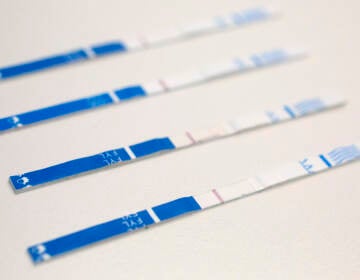Fentanyl laced with animal tranquilizer xylazine has Philly care providers on high alert
The DEA warns that xylazine-fentanyl mixtures are exacerbating the deadly consequences of the opioid crisis.

The DEA is warning about the dangers of fentanyl laced with xylazine. (6abc)
The fentanyl epidemic that is gripping America has taken a grim new turn. This week the U.S. Drug Enforcement Administration issued a dire warning about a dangerous new trend in drug use.
The administration says that the use of fentanyl laced with xylazine — a powerful animal tranquilizer that is approved by the U.S. Food and Drug Administration for veterinary use only — is now the biggest public health threat since the start of the opioid crisis.
Health care providers in Philadelphia have been seeing the horrific fallout of xylazine cases for months, which has spurred local non-profits to take action.
The DEA says that when xylazine — nicknamed “tranq” — is combined with fentanyl, the mixture yields a longer-lasting high than fentanyl does alone. The consequences can be fatal, because xylazine, unlike fentanyl, is not an opioid. Its dangerous side effects include repressed breathing, slow heart rate, and dangerously low blood pressure levels, which cannot be reversed by Naloxone (Narcan), the now-common medication that rapidly reverses opioid overdose.
The potential for xylazine-related fatalities is significant, given research from The Centers for Disease Control and Prevention showing that 107,735 Americans died from “drug poisonings” between August 2021 and August 2022 — 66% from synthetic opioids, such as fentanyl.
“Xylazine is making the deadliest drug threat our country has ever faced — fentanyl — even deadlier,” said DEA Administrator Anne Milgram.
Xylazine can also cause irreversible open wounds that rot skin tissue and cause infections beyond the syringe-injection site, which can result in amputations.
Matthew Salzman, assistant professor at Cooper University Hospital, said that nothing compares to the damage that xylazine does to the human skin. In his 20 years as an emergency medicine physician, he said, “The wounds are worse than I’ve ever seen.”
“Historically, infections from injection-drug use are not uncommon,” said Salzman. “We see patients with abscesses, skin infections and HIV, hepatitis-C. But these soft-tissue wounds with xylazine are different from anything prior to just a year or two ago.”
A number of his patients, Salzman adds, “are terribly malnourished,” which makes their wounds harder to heal — as do the behaviors of opioid-use disorder itself.
“I’ve had multiple patients tell me that they’ll actually continue to inject right into the wounds or right around the wound.”
What healthcare providers are seeing in Camden “very much mirrors what is going on in Philadelphia,” said Salzman, where xylazine use has become prevalent and where a number of his patients obtain their drugs, especially in Kensington. “But the truth is, there has also been a huge uptick in the presence of xylazine in the street supply in New Jersey.”
The DEA’s Millgram said that the administration has already taken steps to slow the progression of xylazine use, which is being abused nationwide.
“DEA has seized xylazine and fentanyl mixtures in 48 of 50 States,” she said. And “the DEA Laboratory System is reporting that, in 2022, approximately 23% of fentanyl powder and 7% of fentanyl pills seized by the DEA contained xylazine.”
The DEA’s announcement follows on the heels of the U.S. Food and Drug Administration’s restrictions of illegal imports of xylazine nearly a month ago.
In February, FDA Commissioner Robert M. Califf said in a statement that the FDA was increasingly concerned about xylazine use, and actions were being taken to stop the scourge.
“We will continue to use all tools at our disposal and partner with the Drug Enforcement Administration and other federal, state, local agencies and stakeholders as appropriate to stem these illicit activities and protect public health,” he said.
WHYY is your source for fact-based, in-depth journalism and information. As a nonprofit organization, we rely on financial support from readers like you. Please give today.





